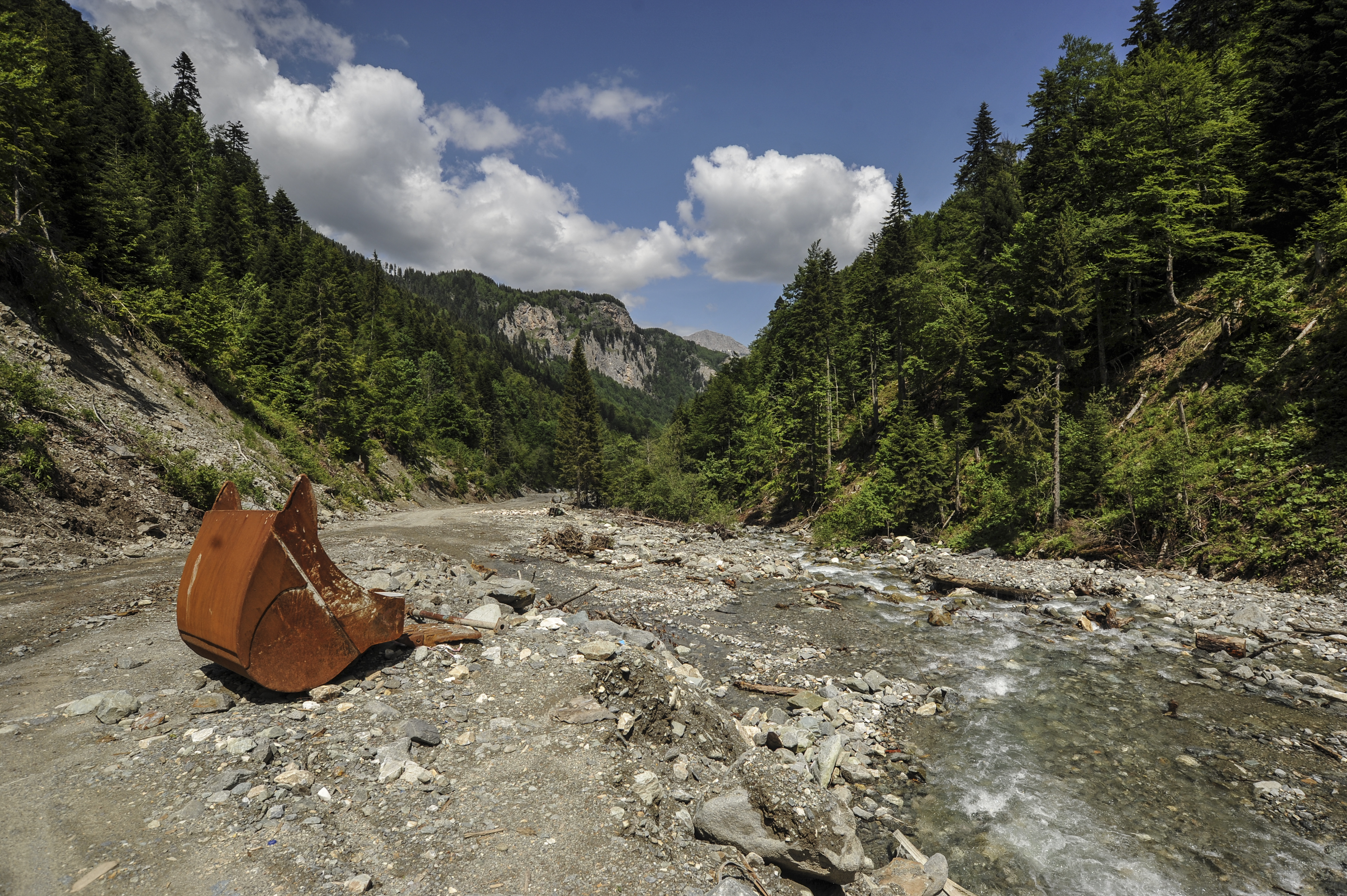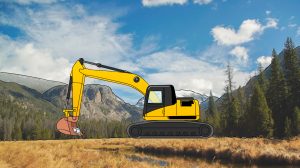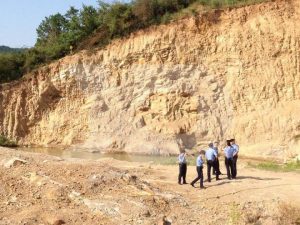Excessive and illegal quarrying has left rivers dry, degraded the landscape and left behind dangerous chasms in the ground. Those benefiting financially from the industry often include relatives of high profile political figures, while the state’s attempts to prevent illegal mining have not proved a deterrent.
M. Thaci is from Guri i Kuq in the municipality of Rahovec. He plans to build a new house in the village and requires tonnes of gravel.
Outside Guri i Kuq only an abandoned quarry pit exists, which is several meters deep and poses a danger to children and animals. But in the neighbouring village of Kramovik, there are several operators selling gravel, and he is searching for the cheapest price.
In Kramovik there is plenty of gravel to search through. Legal and illegal operators extract most of it from the bed of the Drini i Bardhe (The White River), Kosovo’s largest source of fresh water, which joins the Drini i Zi (The Black River) in Albania and flows out into the Adriatic Sea.
“Before, I would come here to fish,” Thaci says, pointing to a swampy surface that was once a riverbed. “It’s not the river it used to be. Since they began extracting the gravel, it is destroyed. There is no fish anywhere.”
Private companies use excavators to extract mixed sand from the river bed, which is carried to a mechanical screen which separates the particles into various sizes. After a cleaning and further separation process, sand and gravel become readily available as a construction material, including in building foundations for roads.
There are several makeshift quarries along the highway from Rahovec to Malisheva. Given the big money they make, high profile political figures often have links to the industry, which ravages hills and rivers.
A recent investigation undertaken by the Independent Commission for Mines and Minerals, ICMM, identified 182 illegal quarrying activities. Due to either completely illegal operations or non-compliance with licenses or permits, many illegal quarrying businesses were prohibited from further operations, while criminal charges were also filed against some offenders.
Meanwhile, many companies conclude their quarrying activities without rehabilitating the degraded surfaces, and the chasms left behind have taken many lives.
The ‘sharks’ swallowing the rivers
Gravel has long been dug out of the country’s rivers, but since 1999 the activity has experienced an increase due to the need to feed the postwar construction boom.
Across Kosovo there are approximately 110 sources of sand and gravel, and official data show that total sand and gravel reserves reach around 331 million cubic meters, mainly concentrated in the country’s riverbeds.
Kosovo’s mining strategy for the period 2012-2025 however, speaks of the need for these riverbeds to be saved from excavation, citing both the environmental impact and unpredictable nature of the operations.
But based on a report by the Ministry of Environment and Spatial Planning which was presented to the author, an enormous area has been damaged by excavating sand and gravel within the last three years.
According to the report, besides the most exploited river, Drini i Bardhe, the following rivers have also been damaged: Lumbardhi i Pejes, Krivareka, Erenik, Desivojca, Morava e Binqes and Ibri. In total, the area degraded is over 1,200 hectares.
In the municipality of Rahovec, there are about 500 hectares of land containing rivers. Inert extraction has caused degradation to the river bed, and, as a consequence, Drini i Bardhe has changed its natural course, as is evidenced by Rahovec’s 2011 Municipal Development Plan.
“Legal and illegal operators operating along the riverbed of Drini i Bardhe […] have degraded large areas of agricultural land and the riverbed, where 403.9 hectares have been destroyed,” the plan reads.
Degradation has only increased in the nearly nine years since this document raised the need for the municipality to “start preventing excavation as a precautionary measure.” Back then, it was considered that the rehabilitation of the degraded areas would be a costly project, which the municipality could not cover with its own funds.
Now, municipal authorities in Rahovec refuse to comment on the situation.
There are also rivers suffering from degradation in the Municipality of Gjakova. Local authorities there have confirmed the damage and state that they have addressed the relevant central authorities about the situation.
“There is significant degradation, especially along the banks of the Ereniku and Drini rivers,” says Nikolle Lleshi, Director of Inspection at the municipality. “The responsibility for rivers outside the urban area lies with the Ministry of Environment and Spatial Planning and the [ICMM].”
The Ministry said that they were working on the issue, although the results were not yet seen on the ground. It highlighted the issue of the degradation of land from the exploitation of the river beds, as well as elevated levels of dust that are generated by the separation process. “The Ministry is constantly inspecting all these operators and, in accordance with legal violations, has taken legal measures,” the Ministry says.
Based on data from the ICMM, the number of companies quarrying for sand and gravel is 24. According to a list presented by the Independent Commission to the author, of these 24 operators, four are licensed.
The others are either illegal, are in the process of being licensed or have been rejected by the ICMM board. The area exposed to quarrying from these companies is over 773,000 square meters.
But even after the ICMM’s investigation and actions to prevent illegal quarrying, the operators in Kramovik have not ceased their activities. Excavators dig into the river bed of Drini i Bardhe, trucks carry sand away continuously, and mechanical separators divide gravel into categories.
The political ‘elephants’ that eat the hills
There are two ways to reach Prishtina from Kramovik: one via the highway to Gjakova, the other via a smaller road connecting Rahovec with Malisheva. Along both roads there are quarries that destroy the hillside.
In Kosovo, there are a large number of hard rock sources that can be used in construction and with the big surge in road construction since 2008, stone has been in high demand.
The ICMM has issued 145 licenses for the extraction of hard stone and 14 licenses for other industrial minerals. A 2018 report from the same Commission show the growth in the industry: Last year mining sector revenues reached more than 26 million euros, while the volume of stone extracted from surface mines is more than 5 million cubic meters.
A study produced by the Democratic Institute of Kosovo, KDI, published last year, addresses what the Institute described as “the political economy of gravel.” The study paints a picture of a captured state, in which the same political interests that have caused a massive spike in investment in roads also control the regulation of gravel extraction.
“[Gravel extraction] is heavily influenced by state regulation – from the licensing stage, to the collection of mineral rents, to the monitoring of environmental pollution – and is in the hands of a limited number of people and institutions,” the study reads. “As such, control over these institutions is key in determining whether processes and outcomes benefit citizens or particularistic interests. As the research shows, the processes have been favouring the latter by far.”
Among the case studies is one of the quarries in the village of Astrazub, near Malisheva. In 2013, an investigative report found that while the company was registered under other names and the owners were changed several times, on several bills issued the contact person listed was the brother of Hashim Thaci, the then Kosovo prime minister and current president.
Founded in 2007, the company initially listed its activities as “engineering project development” and listed its contact person as someone who in 2013 became a member of the ICMM Board. In 2007, the year that Thaci’s Democratic Party of Kosovo, PDK, came to power, the company changed its core business from developing projects to extracting stone.
The quarry has since won millions of euros worth of tenders for its stone, including being contracted by the company which built Kosovo’s most expensive road, the Ibrahim Rugova Highway, which cost around a billion euros and connects Kosovo with Albania.
Municipal authorities indicate that residents living near the quarry have often raised complaints. In 2018, the Municipal Assembly held a debate about quarries operating in the territory of Malisheva, in particular in the villages of Kervansari and Astrazub.
Following the debate, central institutions were called upon to oblige the quarries to comply with the labor criteria under applicable law.
“Regarding the concerns that came from the residents of Astrazub, the municipality has also addressed these concerns to the ICMM and the Ministry of Environment and Spatial Planning,” the municipality stated in a written response. “Quarries are the responsibility of the central authorities and the municipality cannot do more.”
Dibran Kastrati is the Director of Inspection at the municipality. He addressed a letter to the ICMM, stating that although quarries operating in the municipality are licensed, there are many cases that do not comply with the general rules on how to function and operate their business activity.
“We urge you to make an operational plan and, in conjunction with ours, inspect all licensed quarries, as well as potential illegal quarries, for the operation of their activities in general,” the letter reads.
The ICMM has said that illegal operations in these areas are causing huge losses to the state budget, environmental degradation, loss of lives, unfair competition in the market and the use of poor quality materials in constructing road infrastructure.
The ICMM’s Chief Inspector, Fatmir Gerguri, led the investigation into quarrying that extended across Kosovo and took nearly six months of work. He said that during this period, mining prohibition directives have been issued to operators, who were placed under restraint by the relevant regional police forces.
However, the results of the investigation also shows that in Malisheva, as well as in some other cases, some operators continued to operate even after inspectors put prohibitions in place. Geguri believes it is the duty of the local police to monitor such violations, that he says have often occurred in Peja, Malisheva and Kamenica.
A summary report of the investigation provided to the author confirms that it identified a significant number of extraction and processing facilities without a license or permit.
According to mapped statistics, 182 operators from across Kosovo have been closed, of which 36 were in Malisheva and Rahovec. Municipalities with more than 10 operators who have acted illegally or have acted in violation of licenses or permits include Gjakova, Prizren, Peja, Suhareka and Klina.
But even in central Kosovo the situation varies a little. Imer Rrustemi, Director of the Inspectorate at the Municipality of Lipjan revealed that 10 active quarries and seven cement factories were recently inspected in the municipality, two of which were closed because they did not possess a license.
Deadly consequences
An ICMM report has identified many abandoned former quarrying areas with potential risks, as illegal operators have conducted their activities there without taking steps to recultivate the land and ensure its safety.
“We have identified a significant number of abandoned areas that are a potential danger to the community, and all of these are related to the illegal extraction of clay, sand and gravel, and coal,” says Chief Inspector Gerguri. “We are trying to start the rehabilitation of a small number of abandoned mines, but for the rest of the rehabilitations, the Kosovo Geological Service is responsible, with whom we will cooperate to resolve these cases.”
Abandoned pits filled with water have taken many lives over the last two decades. Since 2002, 11 children have drowned, with cases in Istog, Prishtina, Prizren, Mitrovica, Podujevo and Kamenica.
Two siblings also sunk into an open pit in Prishtina’s Kolovica neighbourhood in June 2016. One child was 11 and the other 13. No judicial verdict has been reached in this case, despite six criminal reports being filed against both the operator which extracted the gravel and municipal officials. The father of the children has submitted a letter urging for the acceleration of the case.
Last year’s report issued by the ICMM states that one of the challenges the institution has faced is the inefficiency of the justice system. It also notes that the penalties imposed by the courts for offenders are relatively low. As a result, the actions that have been undertaken by the authorities have not adequately deterred illegal operators.
Recently in Guri i Kuq, M. Thaci’s village, another pit has been left open. He says that chrome was discovered and that someone has extracted ore but not closed the pit, which is now filled with water. According to Thaci, the pit is five meters deep and he has even seen fish in it.
“They loaded the trucks with ore, and they left,” he says. “But we need to take care of the children, because if they go to that pit, they will drown. Let them get rich, but they should not leave these problems behind.”
Feature image: Jete Dobranja for Prishtina Insight.
“This publication has been produced with the assistance of the European Union. The contents of this publication are the sole responsibility of Besnik Krasniqi and can in no way be taken to reflect reflect the views of the European Union or BIRN and AJK.”








